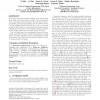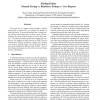613 search results - page 4 / 123 » Finding and Fixing Faults |
123
click to vote
RTCSA
2008
IEEE
15 years 8 months ago
2008
IEEE
Real-time systems typically have to satisfy complex requirements, mapped to the task attributes, eventually guaranteed by the underlying scheduler. These systems consist of a mix ...
133
Voted
ISSTA
2010
ACM
15 years 5 months ago
2010
ACM
In program debugging, finding a failing run is only the first step; what about correcting the fault? Can we automate the second task as well as the first? The AutoFix-E tool au...
98
Voted
ISSRE
2008
IEEE
15 years 8 months ago
2008
IEEE
The usual way to compare testing strategies, whether theoretically or empirically, is to compare the number of faults they detect. To ascertain definitely that a testing strategy...
CCGRID
2008
IEEE
15 years 8 months ago
2008
IEEE
—Accurate fault detection is a key element of resilient computing. Syslogs provide key information regarding faults, and are found on nearly all computing systems. Discovering ne...
ICSE
2007
IEEE-ACM
16 years 1 months ago
2007
IEEE-ACM
We analyze the version history of 7 software systems to predict the most fault prone entities and files. The basic assumption is that faults do not occur in isolation, but rather ...


